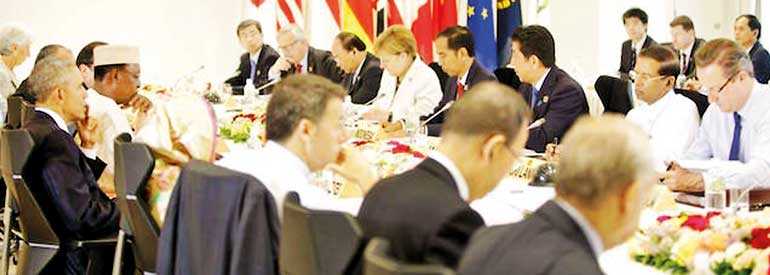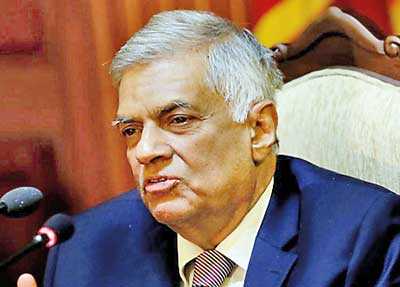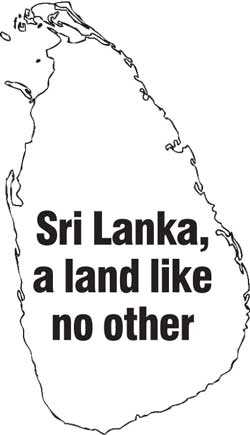Wednesday Feb 18, 2026
Wednesday Feb 18, 2026
Saturday, 15 December 2018 00:03 - - {{hitsCtrl.values.hits}}

President Sirisena at the G7 with the world leaders in Japan. He may not be tolerated anymore by the international community for his unconstitutional and undemocratic acts if he continues to ignore the SC and Parliament verdicts
By Our Special Political Correspondent
Lord Denning M. L., the 20th Century British Judge and Jurist, in his famous book ‘The Family Story’, remarked: “Every Judge, on his appointment, discards all politics and all prejudice. You need have no fear. The Judges of England have always in the past – and will – be vigilant in guarding our freedoms. Someone must be trusted. Let it be the Judges.”
The principle duty of a Judge, especially of the apex court, is to suppress force and fraud. Force is more pernicious when it is open, and fraud, when it is closed and distinguished. Today, Judges are depositaries of laws, the living oracles who are expected, bound by an Oath to defend the Constitution, to decide according to the law. The Supreme Court of Sri Lanka reinforced this principle in a historic judgement on Thursday when a seven-Judge Bench of the Supreme Court unanimously ruled that the Gazette dissolving Parliament, issued by President Sirisena on 9 November, was unconstitutional and illegal, and Parliament cannot be dissolved until four-and-a-half out of its five-year term is completed. The Bench, comprising Chief Justice Nalin Perera and Justices Buwaneka Aluwihare, Sisira J. de Abrew, Priyantha Jayawardana, Prasanna Jayawardena, Vijith K. Malalgoda, and Murdu Fernando, also ruled that the said Proclamation is null and void and has no force or effect in law. Thirteen Fundamental Rights Petitions were filed against the dissolution of Parliament by the President, while eight Petitions were filed to oppose.
Stubborn Sirisena
In the wake of the Supreme Court ruling on Thursday, President Maithripala Sirisena is reported to have told the parliamentary group of the UPFA that he is not ready to work with United National Party (UNP) Leader Ranil Wickremesinghe at any cost. This is despite a majority of Sri Lankan Parliamentarians — including 14 from the Opposition Tamil National Alliance (TNA) — on Wednesday voting for ousted Prime Minister Ranil Wickremesinghe as their preferred candidate to serve in the post. The motion, moved by Sajith Premadasa, Deputy Leader of Wickremesinghe’s UNP, sought to demonstrate the support that the deposed Prime Minister has in the House. The President had also decided not to be party to any national unity government with the UNP hereafter. According to sources, however, there are over five SLFP members willing to join hands with the UNP to form a government. The President so far has offered the Premiership to more than four UNP MPs (Karu Jayasuriya, Sajith Premadasa, John Amaratunga, and Daya Gamage). They have all politely declined. He had said he has no issue even appointing Sambandan over Wickremesinghe. To embarrass the President, a woman named Thakshila Lakmali Jayawardena filed a writ petition in the Court of Appeal (CA) yesterday, seeking an order directing the IGP to go to the District Courts to inquire into President Maithripala Sirisena’s state of mind.
on Thursday, President Maithripala Sirisena is reported to have told the parliamentary group of the UPFA that he is not ready to work with United National Party (UNP) Leader Ranil Wickremesinghe at any cost. This is despite a majority of Sri Lankan Parliamentarians — including 14 from the Opposition Tamil National Alliance (TNA) — on Wednesday voting for ousted Prime Minister Ranil Wickremesinghe as their preferred candidate to serve in the post. The motion, moved by Sajith Premadasa, Deputy Leader of Wickremesinghe’s UNP, sought to demonstrate the support that the deposed Prime Minister has in the House. The President had also decided not to be party to any national unity government with the UNP hereafter. According to sources, however, there are over five SLFP members willing to join hands with the UNP to form a government. The President so far has offered the Premiership to more than four UNP MPs (Karu Jayasuriya, Sajith Premadasa, John Amaratunga, and Daya Gamage). They have all politely declined. He had said he has no issue even appointing Sambandan over Wickremesinghe. To embarrass the President, a woman named Thakshila Lakmali Jayawardena filed a writ petition in the Court of Appeal (CA) yesterday, seeking an order directing the IGP to go to the District Courts to inquire into President Maithripala Sirisena’s state of mind. 
Jayawardena filed the writ petition, seeking the CA to issue a mandate in the nature of a Writ of Mandamus against Fort Police Head Quarters OIC and the IGP, directing them to institute judicial proceedings in District Courts by virtue of Section II of the Mental Diseases Ordinance for the purpose of inquiring into the President’s state of mind.
The events in the last five days clearly demonstrate that a decision to not appoint Ranil Wickremesinghe will go against the spirit of democracy. The two leaders had met last evening at the Secretariat. The Speaker had arranged the meeting. The meeting was cordial. The President had said the SC decision the next day on the Appeal Court Stay Order would influence his decision and would have a bearing on the final outcome. The Stay Order was not lifted by the SC. It has been learnt that Mahinda Rajapaksa would resign in the morning and Ranil Wickremesinghe will be sworn in for the fifth time as Prime Minster. The Parliament has clearly demonstrated that a majority of the MPs are for Wickremesinghe and the continuation of the Government that existed before 26 October. The Parliament has also demonstrated on more than one occasion that Mahinda Rajapaksa does not enjoy the support of a majority (minimum of 113 MPs) in Parliament. It is very likely that the President will have to fight a losing battle, and he will go down in history as the worst Head of State Sri Lanka has ever had after independence if he continues to violate the Constitution.